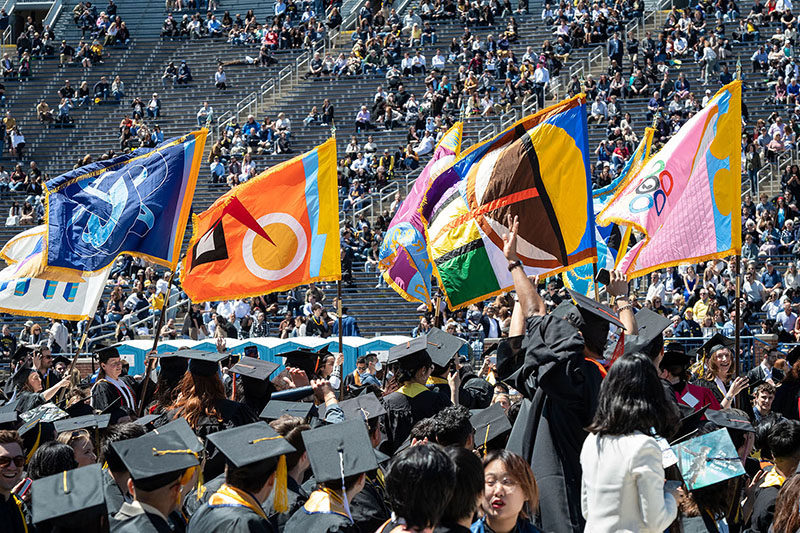FY 2023 Honors

American Academy of Arts and Sciences
Seven University of Michigan faculty members have been named to the American Academy of Arts and Sciences for their significant contributions in scholarly and professional fields. Ruma Banerjee, the Vincent Massey Collegiate Professor of Biological Chemistry; Liliana Borcea, the Peter Field Collegiate Professor of Mathematics; Aaron Dworkin, the former dean and current professor of arts leadership and entrepreneurship at the School of Music, Theatre & Dance; Matthew Fletcher, the Harry Burns Hutchins Collegiate Professor of Law; Sergey Fomin, the Robert M. Thrall Collegiate Professor of Mathematics; Stephanie Fryberg, the University Diversity and Social Transformation Professor of Psychology; and Ivette Perfecto, the James E. Crowfoot Collegiate Professor of Environmental Justice, are among 269 new members to join the academy’s ranks this year. They are being honored for their excellence and leadership across academia, the arts, industry, public policy and research.
American Association for the Advancement of Science Fellows
The American Association for the Advancement of Science elected 17 University of Michigan faculty and staff members as 2022 Fellows. The U-M fellows are: Angela Calabrese Barton, Thomas Carey, Roy Clarke, Kara Gavin, Susan Gelman, Johann Gudjonsson, Joerg Lahann, Jie (Jackie) Li, Donna Martin, Walter Mebane, Asma Nusrat, Charles Parkos, Purnima Kumar, Randy Seeley, John Traynor and Duxin Sun.
Ecological Society of America Fellows
Two University of Michigan faculty members have been chosen as 2023 Fellows of the Ecological Society of America, the world’s largest community of professional ecologists. The society’s fellowship program recognizes the many ways its members contribute to ecological research and discovery, communication, teaching, and management and policy. This year’s honorees include seven Fellows and 10 Early Career Fellows: Meghan Duffy, the Susan S. Kilham Collegiate Professor, Department of Ecology and Evolutionary Biology, ESA Fellow, an aquatic and disease ecologist studying the causes and consequences of infectious disease outbreaks; and María Natalia Umaña, assistant professor, Department of Ecology and Evolutionary Biology, Early Career Fellow, a forest community ecologist interested in understanding underlying mechanisms that foster and maintain diversity.
Fulbright Scholars
More than two dozen University of Michigan students and faculty scholars have been awarded Fulbright grants for the 2022-23 academic year, putting the university among the top-producing institutions in the country for both programs. The grants — one of the U.S. government’s most prestigious awards — will fund overseas research for 15 students and 10 faculty scholars from the Ann Arbor and Dearborn campuses for six to 12 months. Since its inception in 1946, more than 400,000 participants from all backgrounds and fields — including recent university graduates, teachers, scientists, researchers, artists and others from the United States and more than 160 other countries — have participated in the Fulbright Program.
Guggenheim Fellowships
Two University of Michigan scholars are among recipients awarded 2023 fellowships by the John Simon Guggenheim Memorial Foundation. LSA faculty member Monica Dus, associate professor of molecular, cellular, and developmental biology, conducts research on how dietary components interact with genes to shape taste function and feeding behavior. Petra Kuppers, the Anita Gonzalez Collegiate Professor of Performance Studies and Disability Culture and professor of English and women’s studies, is a disability culture activist and a community performance artist. The two were selected to receive the prestigious honor for their distinguished achievement and exceptional promise for future accomplishment.
National Academy of Medicine
Five University of Michigan professors have been chosen as new members of the National Academy of Medicine, the highest honorary society in the country for researchers in the fields of health and medicine. Katherine Gallagher, Michele Heisler, Sachin Kheterpal, Anna Suk-Fong Lok and Bhramar Mukherjee have been recognized for their contributions to a broad range of topics, including cardiovascular disease, epidemiology, hepatology, health inequities, and anesthesiology informatics and clinical research.
National Academy of Sciences
Two University of Michigan professors are among the 2023 inductees into the National Academy of Sciences, one of the highest distinctions for a scientist or engineer in the United States. The academy announced the election of 120 members and 23 international members in recognition of their distinguished and continuing achievements in original research. U-M’s newly elected NAS members are: Maria Carmen Lemos, professor at the School for Environment and Sustainability; professor at the Program in the Environment, College of Literature, Science, and the Arts; and principal investigator of the Great Lakes Integrated Sciences and Assessments program; and Robert Sellers, the Charles D. Moody Collegiate Professor of Psychology and Education, College of Literature, Science, and the Arts and Marsal Family School of Education; and faculty associate, Institute for Social Research.
Sloan Fellows
The Alfred P. Sloan Foundation’s 2023 list of researchers who stand out as the next generation of leaders in scientific research features three University of Michigan researchers. They are among 126 early-career researchers selected from 54 institutions in the United States and Canada. U-M recipients include: Jennifer Bridwell-Rabb, assistant professor of chemistry, College of Literature, Science, and the Arts; Tim Cernak, assistant professor of medicinal chemistry, College of Pharmacy, and assistant professor of chemistry, College of Literature, Science, and the Arts; and Roya Ensafi, assistant professor of electrical engineering and computer science, College of Engineering. Fellows receive a two-year, $75,000 prize that can be used to advance their research. They must hold a doctorate or equivalent degree in chemistry, computer science, earth system science, economics, mathematics, neuroscience, physics or related fields.
